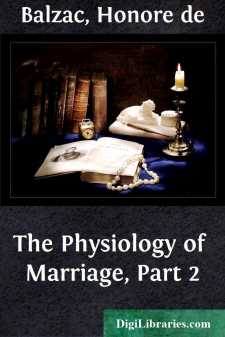Categories
- Antiques & Collectibles 13
- Architecture 36
- Art 48
- Bibles 22
- Biography & Autobiography 813
- Body, Mind & Spirit 142
- Business & Economics 28
- Children's Books 17
- Children's Fiction 14
- Computers 4
- Cooking 94
- Crafts & Hobbies 4
- Drama 346
- Education 46
- Family & Relationships 57
- Fiction 11829
- Games 19
- Gardening 17
- Health & Fitness 34
- History 1377
- House & Home 1
- Humor 147
- Juvenile Fiction 1873
- Juvenile Nonfiction 202
- Language Arts & Disciplines 88
- Law 16
- Literary Collections 686
- Literary Criticism 179
- Mathematics 13
- Medical 41
- Music 40
- Nature 179
- Non-Classifiable 1768
- Performing Arts 7
- Periodicals 1453
- Philosophy 64
- Photography 2
- Poetry 896
- Political Science 203
- Psychology 42
- Reference 154
- Religion 513
- Science 126
- Self-Help 84
- Social Science 81
- Sports & Recreation 34
- Study Aids 3
- Technology & Engineering 59
- Transportation 23
- Travel 463
- True Crime 29
Ferragus
by: Honore de Balzac
Categories:
Description:
Excerpt
CHAPTER I. MADAME JULES
Certain streets in Paris are as degraded as a man covered with infamy; also, there are noble streets, streets simply respectable, young streets on the morality of which the public has not yet formed an opinion; also cut-throat streets, streets older than the age of the oldest dowagers, estimable streets, streets always clean, streets always dirty, working, laboring, and mercantile streets. In short, the streets of Paris have every human quality, and impress us, by what we must call their physiognomy, with certain ideas against which we are defenceless. There are, for instance, streets of a bad neighborhood in which you could not be induced to live, and streets where you would willingly take up your abode. Some streets, like the rue Montmartre, have a charming head, and end in a fish's tail. The rue de la Paix is a wide street, a fine street, yet it wakens none of those gracefully noble thoughts which come to an impressible mind in the middle of the rue Royale, and it certainly lacks the majesty which reigns in the Place Vendome.
If you walk the streets of the Ile Saint-Louis, do not seek the reason of the nervous sadness that lays hold upon you save in the solitude of the spot, the gloomy look of the houses, and the great deserted mansions. This island, the ghost of fermiers-generaux, is the Venice of Paris. The Place de la Bourse is voluble, busy, degraded; it is never fine except by moonlight at two in the morning. By day it is Paris epitomized; by night it is a dream of Greece. The rue Traversiere-Saint-Honore—is not that a villainous street? Look at the wretched little houses with two windows on a floor, where vice, crime, and misery abound. The narrow streets exposed to the north, where the sun never comes more than three or four times a year, are the cut-throat streets which murder with impunity; the authorities of the present day do not meddle with them; but in former times the Parliament might perhaps have summoned the lieutenant of police and reprimanded him for the state of things; and it would, at least, have issued some decree against such streets, as it once did against the wigs of the Chapter of Beauvais. And yet Monsieur Benoiston de Chateauneuf has proved that the mortality of these streets is double that of others! To sum up such theories by a single example: is not the rue Fromentin both murderous and profligate!
These observations, incomprehensible out of Paris, will doubtless be understood by musing men of thought and poesy and pleasure, who know, while rambling about Paris, how to harvest the mass of floating interests which may be gathered at all hours within her walls; to them Paris is the most delightful and varied of monsters: here, a pretty woman; farther on, a haggard pauper; here, new as the coinage of a new reign; there, in this corner, elegant as a fashionable woman. A monster, moreover, complete! Its garrets, as it were, a head full of knowledge and genius; its first storeys stomachs repleted; its shops, actual feet, where the busy ambulating crowds are moving....












